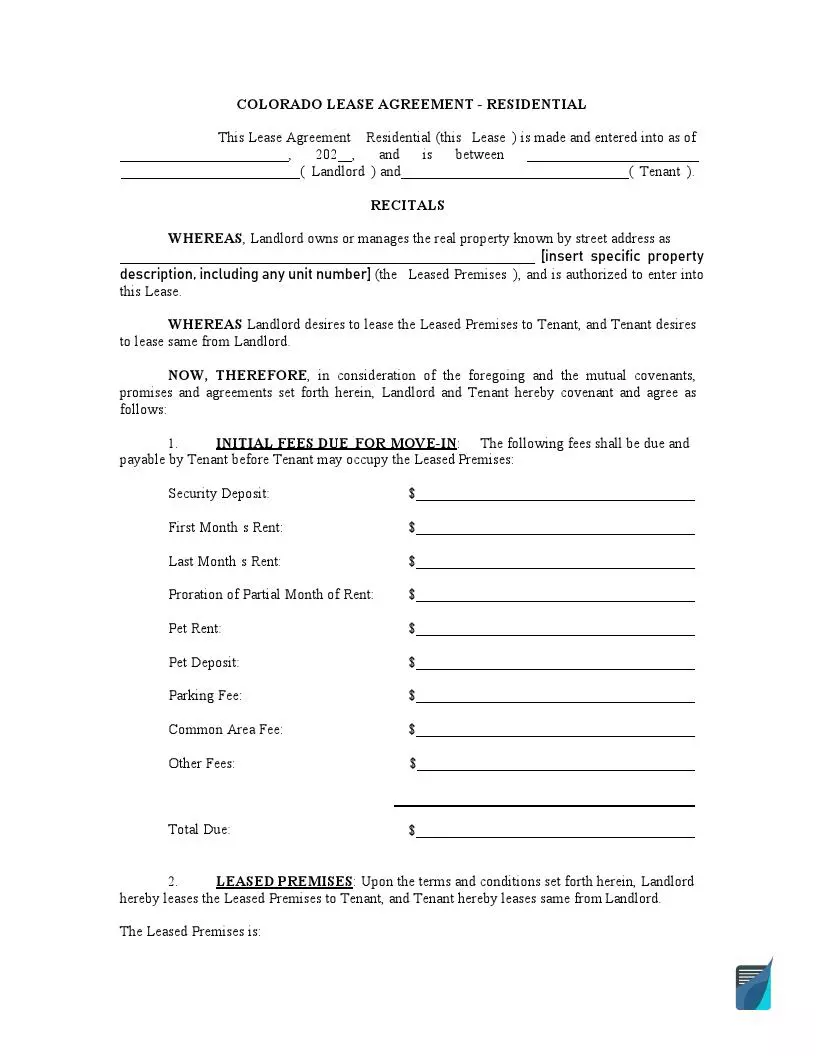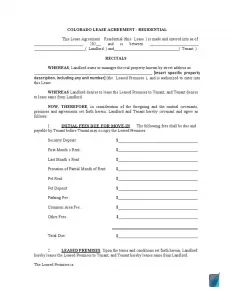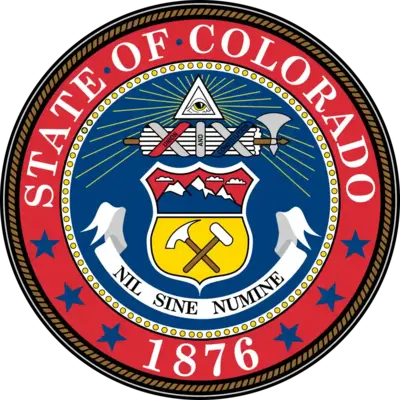Colorado Rental Lease Agreement Forms
Lease agreements exist between the lessee and the leaseholder, also called the “owner” or the “agent” and the “resident,” respectively in Colorado. They outline the conditions of leasing out the property. Although lease agreements are common between landlords and tenants, they can also refer to commercial leases.
Colorado rental lease agreements serve the interests of both parties by protecting their rights in private or commercial contexts. They explicitly state the rights and responsibilities of both parties, the rent amount, and other crucial information.
Both parties want to make sure that certain conditions are met during the lease period. The leasee (also called the renter or a tenant) wants a guarantee that:
- the property is safe;
- the security deposit return conditions are clear;
- they will be undisturbed;
- the period of lease is clearly defined.
The guarantee of these points is beneficial to the property owner, who also wants a fair and transparent arrangement. Creating such an agreement can help prevent arguments over issues that could arise at the end of the tenancy.
To make your lease agreement, you can use our form building software.

Build Your Document
Answer a few simple questions to make your document in minutes
Save and Print
Save progress and finish on any device, download and print anytime
Sign and Use
Your valid, lawyer-approved document is ready
Colorado Laws and Lease Requirements
The Colorado Statutes contain all the information needed for both the owner and the tenant to outline the main terms of a lease. The most common things mentioned in such agreements are:
- the rent amount;
- how long the tenant can reside in the property;
- the amount of security deposit;
- each party’s maintenance responsibilities.
Both sides must understand that as soon as they sign the agreement, it becomes effective and legally binding. There is no period for “rethinking” the decision.
Landlords should be aware of some rules, too. For example, if you do a background or credit check on one prospective tenant, you should do the same for every other prospective tenant..
Security Deposit
A security deposit is also called a damage deposit. It serves to compensate the landlord in case a tenant damages the property or fails to raise the full rent. So, a security deposit protects the rights of the owner.
A common term concerning security deposits is “normal wear and tear.” Under Colorado laws, this refers to deterioration that happens naturally during the use of the property or a unit in this property, but without misuse of the property or accidents. The security deposit does not cover normal wear and tear—there can be no deductions for this.
In Colorado, there is no limit on how much the security deposit can be. This is something that is always agreed upon by both parties and recorded in the lease agreement. According to the Colorado Statutes, the landlord must return the security deposit within a month from the termination of the lease, unless they specified a longer date in the agreement. This period cannot be longer than 60 days, though.
Popular Local Rental Lease Agreement Forms
Landlord’s Right of Entry
The Statutes do not require the landlord to give notice before coming to the property, but it is highly recommended that this is specified in the lease agreement. The most common way of addressing this is to ask the landlord to give reasonable notice to the tenant in case they need to repair anything at the property or if they want to have it inspected. Visitations should also be done at reasonable times.
Mandatory Disclosures
There are mandatory terms that should be outlined in writing in the lease agreement. In Colorado, the following points should be addressed:
- The lease period. A “term lease” or a “definite term” type of lease means that the lease is active for a fixed period. It can be a year or even two years, but can only be terminated on a specific date. When the lease term ends, the parties negotiate another term or stay on a month-to-month basis if the landlord explicitly agrees to it.
- The rent and the due. Remember that if you have a joint type of agreement, then “joint and several liabilities” will apply to paying rent. This is not mandatory by law but is very common. It means that if one co-tenant does not pay the rent, the other co-tenant is liable for the full rent.
- Any penalties for not paying rent on time and when they apply.
- Who is responsible for repairs of different kinds and utility bills.
- How and when the landlord may come to the property.
- Subletting conditions.
- Details on the security deposit.
Colorado Rental Lease Agreement Form Details
| Document Name | Colorado Rental Lease Agreement Form |
| Other Names | CO Rental Lease, Colorado Residential Lease Agreement |
| Relevant Laws | Colorado Revised Statutes, Title 38, Article 12 |
| Security Deposit Amount | No limit |
| Security Deposit Return | One month (if mentioned in a lease), or two months (if not) |
| Avg. Time to Fill Out | 18 minutes |
| # of Fillable Fields | 119 |
| Available Formats | Adobe PDF |


We offer a wide range of key Colorado templates to anybody striving for ease when handling various agreements, contracts, and other paperwork in the state.
Other Rental Lease Agreement Forms by State
